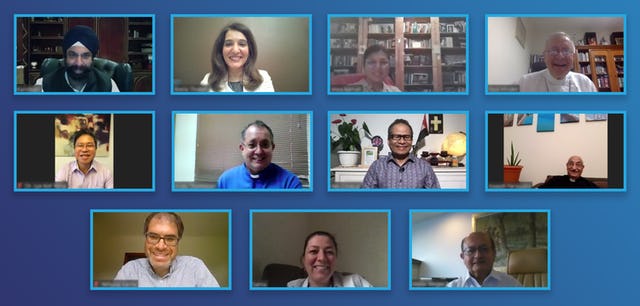The United Arab Emirates (UAE) epitomizes a remarkable tapestry of cultural and religious diversity. In the heart of this burgeoning nation, a distinctive movement has emerged, spearheaded by various faith leaders seeking to foster coexistence among different communities. This endeavor reflects a profound commitment to establish a unified vision rooted in mutual respect, understanding, and collaboration. The Bahá’í teachings, underpinning this initiative, advocate for the essential harmony of humanity and the interconnectedness of all peoples. This article delves into the significant experiences and profound implications of faith leaders promoting coexistence within the UAE.
To comprehend the magnitude of this undertaking, it is imperative to acknowledge the Bahá’í principles that inspire such coexistence. At the core of Bahá’í belief is the idea of the oneness of humanity, which posits that all individuals, regardless of their faith, ethnicity, or background, are fundamentally equal. This tenet surmounts the divisive ideologies that often engender discord among disparate groups. As faith leaders in the UAE embark on this journey towards fostering unity, they not only embrace their unique religious doctrines but also recognize the shared values that bridge their various theological perspectives.
The concept of ‘coexistence’ within the UAE signifies more than mere tolerance; it embodies a transformative approach to social interaction. Faith leaders actively engage in dialogue, cultivating an environment where ideas can flourish without fear of dissent. This practice aligns closely with Bahá’í teachings, which emphasize the importance of communication and understanding as instrumental factors in dismantling prejudices. By fostering an atmosphere of empathy and mutual respect, these leaders are pivotal in altering entrenched perceptions that often hinder communal harmony.
The UAE’s historical and social context further enriches the discourse on coexistence. As a relatively young nation, the UAE has undergone rapid transformation, evolving into a melting pot of cultures. The demographic composition includes a myriad of expatriate communities alongside indigenous Emiratis. This plurality necessitates a re-examination of traditional narratives surrounding identity and belonging. Here, Bahá’í teachings provide an indispensable framework for redefining citizenship beyond ethnicity or creed, suggesting that one’s allegiance lies in the collective progress of society rather than in divisive affiliations.
Faith leaders in the UAE engage in pragmatic initiatives to actualize their vision of coexistence. Interfaith dialogues, community service projects, and educational programs are some of the avenues through which they amplify their message. For instance, the organization of interfaith conferences has become commonplace. These gatherings serve as platforms for the exchange of ideas and foster a spirit of collaboration among diverse communities. The Bahá’í perspective encourages the exploration of spiritual truths common to all religions, thereby facilitating deeper connections among disparate faiths.
An essential outcome of these initiatives is the shifting perspective on religious identity. Traditionally perceived as an affiliation that partitions individuals into distinct categories, faith becomes a catalyst for collective action. In the UAE context, this paradigm shift encourages a paradigm where religious identity is viewed as a source of strength rather than division. Bahá’í leaders exemplify this by articulating a vision of faith that transcends individual dogmas and embraces common humanitarian goals, thereby fostering a sense of shared purpose among congregants of all backgrounds.
The role of education in promoting coexistence cannot be overstated. Bahá’í principles advocate for universal education as a foundational element for societal progress. In the UAE, faith leaders are increasingly prioritizing educational initiatives aimed at youth engagement. By embedding lessons of tolerance, respect, and cooperation within educational curricula, young people are equipped with the tools necessary to navigate a multifaceted world. Such educational endeavors serve to pique curiosity and prompt critical thinking, thereby nurturing the very essence of coexistence that the UAE strives to embody.
The significance of these efforts reverberates beyond the borders of the UAE. The model of coexistence espoused by Emirati faith leaders has garnered international attention, showcasing a progressive framework that other nations may aspire to emulate. As the world grapples with rising sectarianism and intolerance, the UAE’s commitment to unity encapsulates a persuasive counter-narrative, epitomizing a future where diversity is celebrated rather than feared. By fostering an inclusive atmosphere underpinned by Bahá’í teachings, the UAE illustrates the potential of faith-based leadership in cultivating peace and harmony.
In conclusion, the initiative undertaken by faith leaders in the UAE stands as a formidable example of how spiritual principles can inform and transform societal dynamics. The Bahá’í teachings, with their emphasis on the oneness of humanity and the necessity of collaboration, provide a robust foundation for coexistence. As this movement continues to evolve, it promises to challenge conventional perspectives, stimulate curiosity, and ultimately, contribute to the emergence of a harmonious global society. The experiences manifested through this collaborative effort may well serve as a beacon of hope in an increasingly fragmented world, illuminating pathways towards unity and reconciliation.
